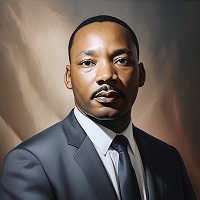

Quotes By Martin Luther King Jr.

Leader
Martin Luther King Jr.
Jan 15, 1929 - Apr 04, 1968
Hate is always injurious. It is as injurious to the hater as it is to the hated.
One of the great philosophical debates of the centuries has been over the whole question of ends and means. In a real sense, the end is pre-existent in the means; the means represent the ideal in the making, and the end in process. In the long run of history, immoral means cannot bring about moral ends.
The Declaration of Independence proclaimed to a world, organized politically and spiritually around the concept of the inequality of man, that the dignity of human personality was inherent in man as a living being.
The Emancipation Proclamation was the offspring of the Declaration of Independence. It was a constructive use of the force of law to uproot a social order which sought to separate liberty from a segment of humanity.
History is a great teacher. Now everyone knows that the labor movement did not diminish the strength of the nation but enlarged it.
Our needs are identical with labor's needs: decent wages, fair working conditions, livable housing, old-age security, health and welfare measures, conditions in which families can grow, have education for their children and respect in the community.
Man is a means to that end. Man has no inalienable rights. His only rights are derived from, and conferred by, the state. Under such a system, the fountain of freedom runs dry. Restricted are man's liberties of press and assembly, his freedom to vote, and his freedom to listen and to read. Art, religion, education, music, and science come under the gripping yoke of government control. Man must be a dutiful servant to the omnipotent state.
It comes to us from the long Christian tradition, Jesus of Nazareth himself, coming down through Mahatma Gandhi of India, who took the love ethic of Jesus Christ and made it effective as a sociopolitical force and brought about the transformation of a great nation and achieved freedom for his people.
If you can't fly, run; if you can't run, walk; if you can't walk, crawl; but by all means keep moving.
The best way to solve any problem is to remove the cause.
The underlying philosophy of segregation is diametrically opposed to the underlying philosophy of democracy and Christianity and all the sophisms of the logicians cannot make them lie down together.
I say, this afternoon, that we cannot solve this problem by turning to Communism. Communism is based on an ethical relativism and a metaphysical materialism that no Christian can accept.
I say to you, today, there is another way that combines the best points of both of these and avoids the evil points of both, and that is what we call nonviolent resistance.
It is my great hope that as the Negro plunges deeper into the quest for freedom, he will plunge deeper into the philosophy of non-violence. As a race we must work passionately and unrelentingly for first-class citizenship, but we must never use second class methods to gain it.
We must never become bitter nor should we succumb to the temptation of using violence in the struggle, for if this happens, unborn generations will be the recipients of a long and desolate night of bitterness and our chief legacy to the future will be an endless reign of meaningless chaos.
In this period of social change the Negro must work on two fronts. On the one hand we must continue to break down the barrier of segregation. We must resist all forms of racial injustice. This resistance must always be on the highest level of dignity and discipline.
Whenever racial discrimination exists it is a tragic expression of man's spiritual degeneracy and moral bankruptcy. Therefore, it must be removed not merely because it is diplomatically expedient, but because it is morally compelling.
If man fails to reorientate his life around moral and ethical values he may well destroy himself by the misuse of his own instrument.
I think we have been in the mountain of moral and ethical relativism long enough. To dwell in this mountain has become something of a fad these days, so we have come to believe that morality is a matter of group consensus.
While we are mindful of the shocking fact that less than one-half of all non-white workers are covered by the Fair Labor Standards Act, we do not speak for Negro workers only. A living wage should be the right of all working Americans, and this is what we wish to urge upon our Congressmen and Senators as they now prepare to deal with this legislation.
Popular Authors









